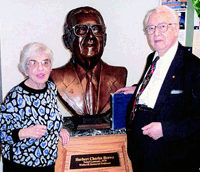The Founders - Dr. and Mrs. Brown

Herbert C. Brown was born in London on May 22, 1912, but was brought to the U.S. at age two and grew up in Chicago. He enrolled in Crane Junior College in 1933, where he met Sarah Baylen (b. January 10, 1916), his wife of more than 68 years.
When Crane closed for lack of funds in June 1933, they continued their training in the home laboratory of one of their teachers, Nicholas D. Cheronis. When new colleges were opened in 1934, they attended Wright Junior College, where Sarah autographed his yearbook with the inscription, "To a future Nobel Laureate."
They then entered the University of Chicago in 1935 as juniors. H. C. Brown completed two years of work in one year and graduated in 1936. A graduation gift from Sarah, Alfred Stock's Baker Lectures on "Hydrides of Boron and Silicon," was in part responsible for his choosing H.I. Schlesinger as his graduate research advisor at Chicago. His Ph.D. thesis (1938) dealt with the reduction of carbonyl compounds with diborane.
Sarah and Herb were married "secretly" in 1937. They had a son, Charles in 1944, who became a chemist, B.S. Purdue (1964), Ph.D., University of California, Berkeley (1967). After a year of postdoctoral work with M. S. Kharasch, H. C. Brown became Assistant to Schlesinger (with rank of instructor) and codiscovered sodium borohydride.
He became Assistant Professor at Wayne (now Wayne State) University in 1943, where he explored steric strains. He was promoted to Associate Professor in 1946. In 1947 he moved to Purdue University as Professor. He was promoted to R. B. Wetherill Professor in 1959 and R. B. Wetherill Research Professor in I960.
He received 14 Honorary Doctorates including one from the University of Chicago in 1968. Since his "retirement" in 1978, he had been R. B. Wetherill Professor Emeritus until he passed away on December 19, 2004. Sarah Brown passed away on May 29, 2005.
He published seven books and 1,266 scientific publications. He won the majority of major awards in his field, including the Nobel Prize for Chemistry in 1979, the ACS Award for Creative Research in Organic Chemistry (I960), the National Medal of Science (1969), the Roger Adams Award (1971), the Priestley Medal (1981), the Perkin Medal (1982), the American Institute of Chemists Gold Medal Award (1985), the National Academy of Sciences Award in Chemical Sciences (1987), the Emperor's Decoration (Japan): Order of the Rising Sun, Gold and Silver Star (1989), Honorary Scholar of the University of Wales, Swansea (1994). In 1998 he was the inaugural winner of the ACS Herbert C. Brown Medal and Award for Creative Research in Synthetic Methods. He was named "One of the Top 75 Contributors to the Chemical Enterprise in the Past 75 Years," C&E News (1998).